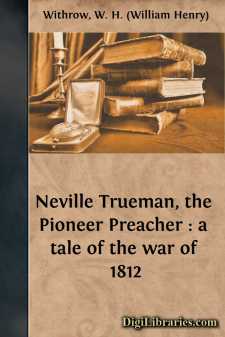Categories
- Antiques & Collectibles 13
- Architecture 36
- Art 48
- Bibles 22
- Biography & Autobiography 813
- Body, Mind & Spirit 142
- Business & Economics 28
- Children's Books 17
- Children's Fiction 14
- Computers 4
- Cooking 94
- Crafts & Hobbies 4
- Drama 346
- Education 46
- Family & Relationships 57
- Fiction 11829
- Games 19
- Gardening 17
- Health & Fitness 34
- History 1377
- House & Home 1
- Humor 147
- Juvenile Fiction 1873
- Juvenile Nonfiction 202
- Language Arts & Disciplines 88
- Law 16
- Literary Collections 686
- Literary Criticism 179
- Mathematics 13
- Medical 41
- Music 40
- Nature 179
- Non-Classifiable 1768
- Performing Arts 7
- Periodicals 1453
- Philosophy 64
- Photography 2
- Poetry 896
- Political Science 203
- Psychology 42
- Reference 154
- Religion 513
- Science 126
- Self-Help 84
- Social Science 81
- Sports & Recreation 34
- Study Aids 3
- Technology & Engineering 59
- Transportation 23
- Travel 463
- True Crime 29
Neville Trueman, the Pioneer Preacher : a tale of the war of 1812
Description:
Excerpt
CHAPTER I.
WAR CLOUDS.
Now lower the dreadful clouds of war;
Its threatening thunder rolls afar;
Near and more near the rude alarms
Of conflict and the clash of arms
Advance and grow, till all the air
Rings with the brazen trumpet blare.
Towards the close of a sultry day in July, in the year 1812, might have been seen a young man riding along the beautiful west bank of the Niagara River, about three miles above its mouth. His appearance would anywhere have attracted attention. He was small in person and singularly neat in his attire. By exposure to summer's sun and winter's cold, his complexion was richly bronzed, but, as he lifted his broad-leafed felt hat to cool his brow, it could be seen that his forehead was smooth and white and of a noble fulness, indicating superior intellectual abilities. His hair was dark,
—his eye beneath
Flashed like falchion from its sheath.
His bright, quick glances, alternating with a full and steady gaze, betokened a mind keenly sympathetic with emotions both of sorrow and of joy. His dress and accoutrements were those of a travelling Methodist preacher of the period. He wore a suit of "parson's grey," the coat having a straight collar and being somewhat rounded away in front. His buckskin leggings, which descended to his stirrups, were splashed with mud, for the day had been rainy. He was well mounted on a light-built, active-looking chestnut horse. The indispensable saddle-bags, containing his Greek Testament, Bible, and Wesley's Hymns, and a few personal necessaries, were secured across the saddle. A small, round, leathern valise, with a few changes of linen, and his coarse frieze great-coat were strapped on behind. Such was a typical example of the "clerical cavalry" who, in the early years of this century, ranged through the wilderness of Canada, fording or swimming rivers, toiling through forests and swamps, and carrying the gospel of Christ to the remotest settlers in the backwoods.
Our young friend, the Rev. Neville Trueman, afterwards a prominent figure in the history of early Methodism, halted his horse on a bluff jutting out into the Niagara River, both to enjoy the refreshing breeze that swept over the water and to admire the beautiful prospect. At his feet swept the broad and noble river, reflecting on its surface the snowy masses of "thunderhead" clouds, around which the lightning still played, and which, transfigured and glorified in the light of the setting sun, seemed to the poetic imagination of the young man like the City of God descending out of heaven, with its streets of gold and foundations of precious stones, while the rainbow that spanned the heavens seemed like the rainbow of the Apocalypse round about the throne of God.
Under the inspiration of the beauty of the scene, the young preacher began to sing in a clear, sweet, tenor voice that song of the ages, which he had learned at his mother's knee among the green hills of Vermont—
Jerusalem the golden,
With milk and honey blest,
Beneath thy contemplation,
Sink heart and voice opprest,
I know not, oh!...


